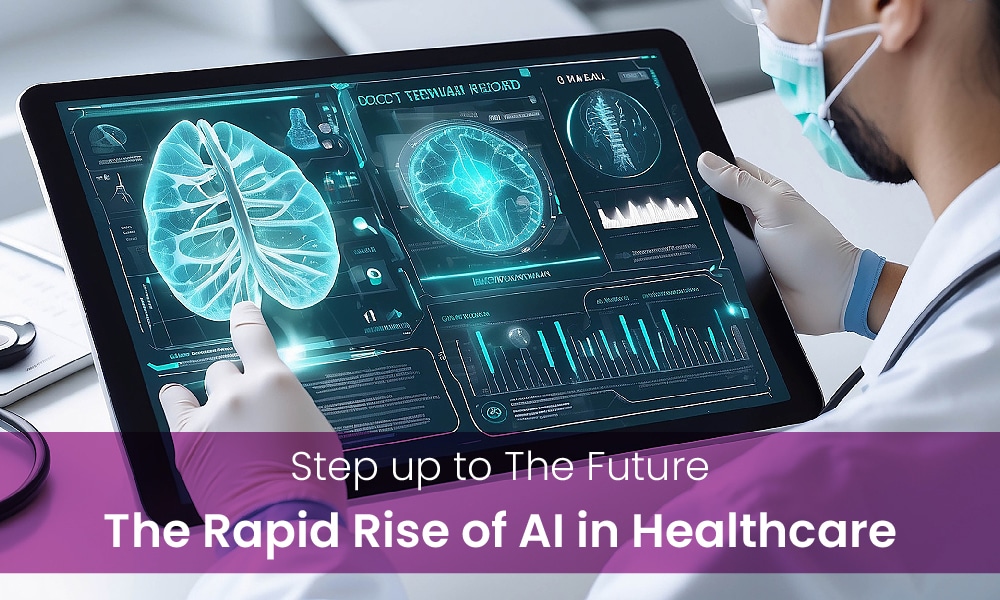
In recent years, the healthcare industry has witnessed a profound transformation with the integration of artificial intelligence in medical field technologies. From disease diagnosis to patient care and hospital management, AI is revolutionizing every aspect of healthcare delivery. One area where AI is making significant strides is in hospital management systems. It plays a crucial role in optimizing operations, improving patient outcomes, and enhancing overall efficiency.
In this blog post, we will explore the transformative impact of AI on hospital management systems. We will also cover the various software solutions that are driving this change. AI-powered hospital management software is reshaping the way healthcare facilities operate. It is aligning administrative tasks to improving resource allocation and patient care. Let’s delve into how artificial intelligence in medical field is reshaping the future of healthcare delivery and the key software solutions that are driving this transformation.
Gigantic Shift of AI Towards Medicine in the Age of COVID-19
In the wake of the COVID-19 pandemic, the healthcare sector has witnessed a rapid integration of AI technologies. These changes marked a significant shift in how we approach medical care. From disease detection to personalized medicine, AI in healthcare has become an invaluable tool across various domains within healthcare. With the pandemic further accelerating this adoption, artificial intelligence in medical field is now being utilized for medical imaging, treatment planning, drug discovery, predictive analytics, and more. In a study conducted in 2021, Mistry C. et al. highlighted the necessity of advanced digital devices. The digital services not only can enhance customer satisfaction, enabling health status monitoring, but also can ensure better drug adherence. As we navigate this digital transformation, it becomes increasingly important for healthcare professionals, particularly those in leadership roles, to anticipate these changes. The need to forecast their impact, and strategically plan for the future of medicine. 1
How (Artificial Intelligence) AI in Healthcare Field is Revolutionizing Hospital Management and Healthcare Delivery

Here are the uses of artificial intelligence in medical field technology in healthcare, especially in hospital management systems to play a crucial role in enhancing healthcare delivery, improving patient outcomes, and optimizing hospital management systems.
Machine Learning (ML):
- ML algorithms can analyze large volumes of healthcare data to identify patterns and trends, aiding in disease diagnosis, treatment planning, and patient monitoring.
- ML-powered predictive analytics can forecast patient outcomes, identify high-risk patients, and prevent adverse events, enabling proactive and personalized patient care.
- ML-based fraud detection algorithms can identify fraudulent claims and transactions, helping healthcare organizations reduce financial losses and maintain compliance.
Deep Learning (DL):
- DL algorithms can analyze medical images such as X-rays, MRIs, and CT scans with high accuracy. It can assist radiologists in detecting abnormalities and making accurate diagnoses.
- DL-powered natural language processing (NLP) models can extract valuable information from unstructured clinical notes. That can enable automated coding, clinical documentation, and data analysis.
- DL-based predictive models can identify patients at risk of developing chronic conditions or experiencing complications, enabling early intervention and preventive care.
Natural Language Processing (NLP):
- NLP algorithms can analyze and interpret clinical notes, medical transcripts, and patient records, extracting valuable insights for clinical decision-making and research.
- NLP-powered chatbots and virtual assistants can automate patient communication, appointment scheduling, and medication reminders, enhancing patient engagement and satisfaction.
- NLP-based sentiment analysis tools can analyse patient feedback, social media posts, and online reviews to monitor patient satisfaction and identify areas for improvement in healthcare services.
Robotics:
- Robotic process automation (RPA) can automate routine administrative tasks such as data entry, appointment scheduling, and billing. It can also reduce administrative burden and improving operational efficiency.
- Surgical robots can assist surgeons in performing minimally invasive surgeries with greater precision, reducing the risk of complications, minimizing patient recovery time, and improving surgical outcomes.
- Robotic exoskeletons and assistive devices can aid patients with mobility impairments, enabling them to regain independence and improve their quality of life.
Artificial Neural Network (ANN):
- ANNs can analyze complex medical data such as genetic sequences, patient histories, and treatment outcomes. Which is used to identify predictive biomarkers, personalized treatment plans, and optimal care pathways.
- ANN-powered decision support systems can assist healthcare providers in making evidence-based treatment decisions, reducing diagnostic errors, and improving patient outcomes.
- ANN-based predictive models can forecast patient readmissions, hospital-acquired infections, and other adverse events, enabling proactive interventions and preventive care strategies.
Convolutional Neural Network (CNN):
- CNNs can analyze medical images such as X-rays, MRIs, and CT scans to detect abnormalities, tumors, and other pathologies with high accuracy, assisting radiologists in diagnosis and treatment planning.
- CNN-powered image segmentation algorithms can identify and delineate specific structures or organs within medical images, facilitating precise localization and analysis of abnormalities.
- CNN-based predictive models can analyze patterns in medical images and patient data to predict disease progression, treatment response, and patient outcomes, enabling personalized and data-driven healthcare.

All are Evolving with AI and So Is Ezovion!
Ezovion is already leveraging AI and ML technologies to enhance healthcare delivery. We are now preparing further to implement AI in our services to enhance our capabilities even more.
Data Analysis and Management:
To ensure robust data collection and management systems where artificial intelligence in medical field thrives on large datasets to learn and make predictions.
Patient Engagement:
Addition of AI to personalize patient interactions, predict patient needs, and provide tailored health recommendations.
Operational Efficiency:
We are planning to implement AI in healthcare to work on administrative tasks, such as scheduling, billing, and claims processing with the help of AI to reduce human error and save time.
Clinical Decision Support:
In the future, we will develop AI tools to assist healthcare providers with diagnosis and treatment plans by analyzing patient data and medical literature.
Remote Monitoring:
We will plan the integration of AI with wearable devices to monitor patients’ health in real-time and alert healthcare providers to potential issues.
Limitation of Artificial Intelligence in Medical Field over Human Intervention in Healthcare
The integration of AI technology into healthcare systems has the potential to revolutionize patient care and optimize hospital management. However, as with any transformative technology, the dynamics of human-AI interaction within healthcare settings raise significant considerations. Trust, both from healthcare professionals and patients, is paramount for the effective utilization of AI systems. Yet, concerns such as over-reliance on AI in healthcare, the potential deskilling of medical professionals, and the necessity for meaningful oversight of AI decisions cannot be overlooked. It is imperative that AI functions as a supportive tool rather than a replacement for human judgment. We still have a need to maintain the quality of care and professional integrity within healthcare. Achieving this balance requires ongoing education and training for healthcare professionals. These practices can maintain an effective collaboration with AI technologies, understanding both their capabilities and limitations.
Conclusion
In conclusion, while artificial intelligence in medical field presents transformative potential for healthcare. AI is addressing challenges such as data privacy and security, ethical and legal considerations, interoperability and integration, scalability, accessibility, and human-AI interaction is crucial for realizing its full benefits. Overcoming these challenges necessitates a collaborative effort among AI developers, healthcare providers, policymakers, and the wider community. That ensures that AI in healthcare technologies is implemented securely, ethically, and in a manner that enhances the quality of healthcare for all.
Reference-
Advancing Patient Care: How Artificial Intelligence Is Transforming Healthcare – PMC (nih.gov)





